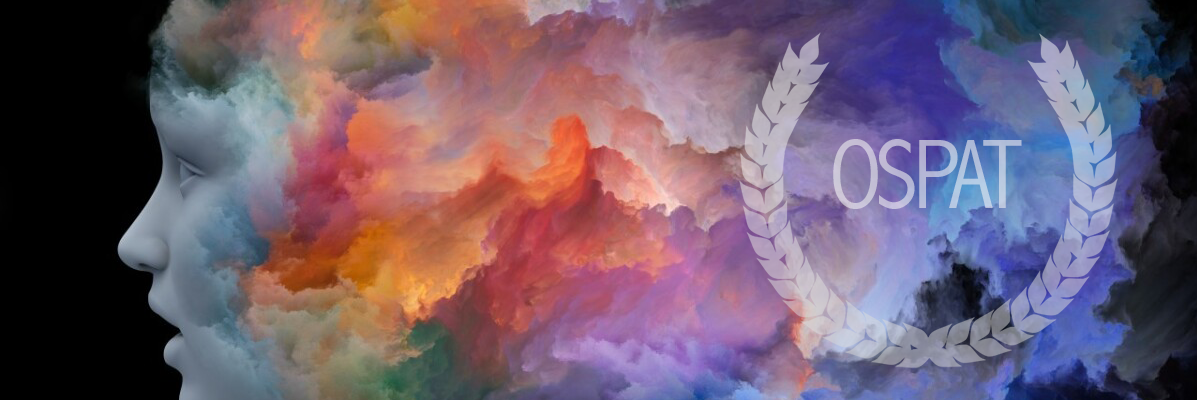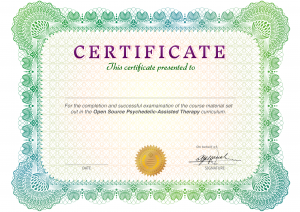Certificate in Psychedelic Assisted Therapy
A Certificate in Psychedelic Assisted Therapy (CPAT), is the result of the successful completion of a Psychedelic Assisted Therapy Course (PATC). PATCs are courses developed by various organisations (see below) in order to teach guiding clinicians best practice techniques when guiding patients prior, during, and following a psychedelic experience.
Numerous studies[1][2] and a systematic review[3] have concluded that supportive therapeutic guidance should be considered the standard of care in the majority of uses of psychedelic medications for the treatment of psychiatric disorders. As there is currently a world wide shortage of psychedelic integration guides[4], a wide array of courses have been developed to encourage more people to become guides. Psychedelic Assisted Therapy training guidelines were initially developed in the US[5] however, more recently there has been the establishment of an increasing number of courses worldwide, these include:
- Embark - Canadian / US proprietary training created by Cybin ltd first released in June 2022[6].
- CPAT - Australian proprietary training created by Mind Medicine Australia.
- CIIS - California Institute of Integral Studies, certifies for Psychedelic Therapies and Research.
- Fluence - a private psychological services company fully owned and operated by Dr. Ingmar Gorman and Dr. Elizabeth Nielson.
- MAPS - MDMA Training Therapy Program
- SCPTR - Salt City Psychedelic Therapy & Research is to educate and train. This 8-week live virtual program.
In late 2022, a multidisciplinary healthcare team convened consisting of psychotherapists, psychiatrists, neuropsychopharmacologists and mental health nurses to review the content of the courses listed above. It was found whilst the content was satisfactory (see summary of analysis below) that the financial incentives behind the creation of such a course biased the content of the course itself. For example, many of the courses offered above were been created on the basis that the practitioner works within a structured clinical pathway which would require the use of proprietary medicines. As a result, to remove this potential for bias the multidisciplinary group created the world's first Open Source Psychedelic-Assisted Therapy (OSPAT) which is available for anyone to use, free of charge.
CPAT Content
The majority of PAP models have drawn influence from 3 main sources[7]:
- Early work of PAP pioneers - mainly Grof, Greer and Tolbert and Stolaroff.
- Indigenous approaches[8]
- Non-psychedelic therapeutic approaches[9]
However, one often neglected source of data is accumulated by people who use psychedelics (PWUP) outside of clinical contexts[10]. All sources highlight the need for controlling three key parameters:
- Patient attributes: medical exclusions, psychological framing.
- Setting attributes: music, light, furnishing, nature immersion[11].
- Clinician attributes: background, experience, theoretical certification (such as CPAT)
CPAT Structure
All PAT training models train the practitioner to concentrate on three key phases of psychedelic therapy[12]. These include:
- Preparation session(s) make up the first stage and are intended to prime individuals to get ready to benefit from the medication.
- Medicine session(s), which refers to the period when medication is administered.
- Integration involves a process of reflection on the medicine session and how it could motivate cognitive and behavioural changes that last after the course of therapy.
How to manage these three phases is taught via a syllabus which covers:
- History of Psychedelics: Philosophy, Indigenous Traditions, Renaissance.
- Types of therapy: Legality, Ethics.
- Medical attributes of Psychedelics: Current Research, Addiction, Depression, PTSD & Trauma.
- Navigating the experience: Preparation, Spaceholding, Set and Setting: Music Theory.
- Integration: Harm Reduction.
Clinical Governance
Due to the inducement of a neuroplastic state the vulnerability of the patient increases. Conduct of practice should be guided by a specific code of ethics and followed by a transparent clinical governance mechanism.
References
- ↑ Psychedelic-Assisted Psychotherapy: A Paradigm Shift in Psychiatric Research and Development. Eduardo Ekman Schenberg. Front Pharmacol. 2018; 9: 733. Published online 2018 Jul 5. doi: 10.3389/fphar.2018.00733.
- ↑ Ethical and legal issues in psychedelic harm reduction and integration therapy. Brian Pilecki, Jason B. Luoma, Geoff J. Bathje, Joseph Rhea & Vilmarie Fraguada Narloch. Harm Reduction Journal volume 18, Article number: 40 (2021)
- ↑ A systematic review of psychedelic-assisted psychotherapy for mental health: An evaluation of the current wave of research and suggestions for the future. Wheeler, S. W., & Dyer, N. L. (2020). Psychology of Consciousness: Theory, Research, and Practice, 7(3), 279–315. https://doi.org/10.1037/cns0000237
- ↑ MDMA-Therapy Expert Dr. Rick Doblin: Boston Magazine. Initially published in 2019 accessed on 9th August 2022 via https://www.bostonmagazine.com/health/2019/09/10/rick-doblin/
- ↑ Developing Guidelines and Competencies for the Training of Psychedelic Therapists. Phelps, J. (2017). Journal of Humanistic Psychology, 57(5), 450–487. doi:10.1177/0022167817711304
- ↑ Models of Psychedelic-Assisted Psychotherapy: A Contemporary Assessment and an Introduction to EMBARK, a Transdiagnostic, Trans-Drug Model. William Brennan and Alexander B. Belser. Cybin, Inc., Toronto, ON, Canada and Fordham University, New York City, NY, United States. Front. Psychol., 02 June 2022 https://doi.org/10.3389/fpsyg.2022.866018
- ↑ Phelps, J. (2017). Developing Guidelines and Competencies for the Training of Psychedelic Therapists. Journal of Humanistic Psychology, 57(5), 450–487. doi:10.1177/0022167817711304
- ↑ The role of Indigenous knowledges in psychedelic science. Fotiou, E. (2020). J. Psychedelic Stud. 4, 16–23. doi: 10.1556/2054.2019.031
- ↑ Psychedelics and the new behaviourism: considering the integration of third-wave behaviour therapies with psychedelic-assisted therapy. Walsh, Z., and Thiessen, M. S. (2018). Int. Rev. Psychiatry 30, 343–349. doi: 10.1080/09540261.2018.1474088
- ↑ Presence, Trust, and Empathy: Preferred Characteristics of Psychedelic Carers. Thal S, Engel LB, Bright SJ. Journal of Humanistic Psychology. March 2022. doi:10.1177/00221678221081380
- ↑ Virtual Reality as a Moderator of Psychedelic-Assisted Psychotherapy Agnieszka D. Sekula1,2*, Luke Downey1,3 and Prashanth Puspanathan2 1 Centre for Human Psychopharmacology, Swinburne University of Technology, Hawthorn, VIC, Australia, 2 Enosis Therapeutics Pty. Ltd., Melbourne, VIC, Australia, 3 Institute for Breathing and Sleep, Austin Hospital, Melbourne, VIC, Australia
- ↑ The Psychotherapeutic Framing of Psychedelic Drug Administration. Front. Psychol., Sec. Psychology for Clinical Settings. Published: 02 June 2022, accessed on 9th August 2022 via: https://doi.org/10.3389/fpsyg.2022.866018

